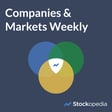
IG buys Freetrade, investing mistakes, and the Smiths News debate
In this week’s episode, Lawrence is joined by Graham Neary and Mark Simpson to discuss:
- IG Group’s acquisition of Freetrade for £160m - as a long-term IGG shareholder, what does Graham think of the acquisition? What is IGG really buying here?
- Premier Miton’s latest results, and opportunities in asset managers.
- The investment case for Smiths News. Is it a melting ice cube, or a van full of newspapers hurtling towards a cliff-edge?
- Mark’s analysis of his own investing mistakes in 2024, as well as his and Graham’s differing approach to position sizing in their portfolios.
If you enjoyed this, you can read daily analysis on noteworthy and hard-to-research shares with Stockopedia’s Daily Stock Market Report. You’ll also unlock award-winning investing insights, tools, and education to speed up your research process and help you make more informed decisions.
Try Stockopedia free for 14 days at stk.pe/pod.
Stocks we discuss
- IG Group: https://www.stockopedia.com/share-prices/ig-group-LON:IGG/
- Plus500: https://www.stockopedia.com/share-prices/plus500-LON:PLUS/
- CMC Markets: https://www.stockopedia.com/share-prices/cmc-markets-LON:CMCX/
- Premier Miton: https://www.stockopedia.com/share-prices/premier-miton-LON:PMI/
- Impax Asset Management: https://www.stockopedia.com/share-prices/impax-asset-management-LON:IPX/
- Liontrust Asset Management: https://www.stockopedia.com/share-prices/liontrust-asset-management-LON:LIO/
- Polar Capital Holdings: https://www.stockopedia.com/share-prices/polar-capital-holdings-LON:POLR/
- Smiths News: https://www.stockopedia.com/share-prices/smiths-news-LON:SNWS/
Extra Stockopedia content we mention:
- My biggest investing mistakes of the last year (subscriber-only): https://app.stockopedia.com/content/my-biggest-investing-mistakes-of-the-last-year-1020511
- Profit or loss? How to make smarter stock selling decisions: https://www.stockopedia.com/academy/events/how-to-make-smarter-stock-selling-decisions/
Let us know what you thought of this episode - email lawrence@stockopedia.com or tweet us @Stockopedia.
Disclosures: At the time of recording, Graham owns shares in IG and Impax Asset Management. Lawrence owns shares in CMC Markets.
Disclaimer: We do not provide personalised financial advice. None of our content constitutes or should be understood as constituting a recommendation to enter in any securities transactions or to engage in any investment strategies discussed in our content. We do not provide personalised recommendations or views as to whether a stock or investment approach is suited to the financial needs of a specific individual. It is very important to do your own analysis before making any investment based on your own personal circumstances.
